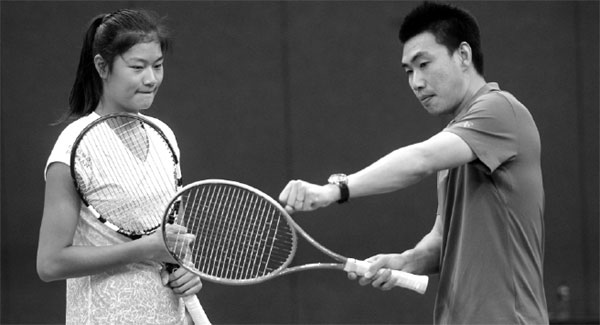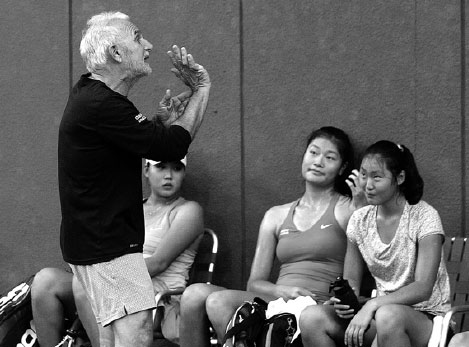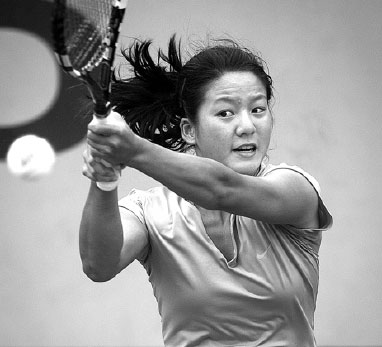Tennis school aims to produce Li Na's successor
Updated: 2015-07-20 07:54
By Lei Lei(China Daily)
|
|||||||||||
Young players to enjoy flexibility and more global opportunities
When Li Na announced her retirement from competitive tennis last year, the search for China's next tennis superstar shifted several gears as coaches across the country frantically attempted to spot her likely successor.
Yi Ping, founder of the 1123 Junior Tennis Academy in Beijing, is convinced that her new training model, far removed from the old State system, gives the academy a great chance of producing China's next world-beating tennis player.
|
Zeng Shaoxuan, a former men's national champion and now a coach at the 1123 Junior Tennis Academy, demonstrates a move to Cao Siqi. Zou Hong / China Daily |
|
Francisco Mastelli from Argentina gives instructions to young players at a training session in Beijing. Zou Hong / China Daily |
|
Zheng Wushuang, China's No 2 junior player, occupies 18th place in the world junior rankings. Chen Xiaowei / Xinhua |
"My goal is to bring up the 'next Li Na' for China," she said. "I want these young players to realize the dream I failed to achieve when I was playing."
The 50-something former player admits that she was never a top-class performer, but she never forgot the tennis dreams of her youth, so she founded 1123 - named after the date it opened, Nov 23, 2010 - to train promising players 18 and younger. They sign lifetime contracts and, in turn, the academy covers all their costs for training and competition.
At the moment, seven girls attend the academy, including China's No 2, Zheng Wushuang, 16, who occupies 18th place in the world junior rankings. The girls train for about six hours a day, five and a half days a week.
Ping An, one of China's biggest insurance companies, is the academy's main sponsor, while Nike and Babolat provide clothing and equipment.
"I only want to take China's most promising players so I can maximize the resources I can provide for them," Yi said. "A lot more junior players want to come, but we have to see great potential before we decide if we want them. We want to have all the top junior players in our club, as well as the top coaches."
There are eight coaches, led by Francisco Mastelli, a 63-year-old Argentinian who has coached both his national team and David Nalbandian, one of Argentina's best-known players of recent decades.
The other coaches are former top-level Chinese players, such as Zeng Shaoxuan, a former men's national champion, and Zhang Yu, husband of Zheng Jie, a two-time grand slam women's doubles champion.
"It's been a good challenge for me, to come to this country and showcase my work," said Mastelli, who is in his third year at the academy. "The important thing is to have a large base, then you can choose a champion. Here they (the students) are of a good standard."
'Flyaway' flexibility
Starting with Li's generation, China's top tennis players enjoyed a "flyaway" from the traditional State system for cultivating sports stars, and employed their own support teams. Now, younger players are becoming independent at an earlier age.
Xu Shilin, China's top girl and currently No 1 in the International Tennis Federation's world junior rankings, attends an academy in Florida. Unlike most young players in China, who train with local clubs or State-run sports schools, Xu is free to decide her own schedule, and enjoys more opportunities to play on the world stage.
Yi's academy operates a similar system, and the fact that the students don't have to pay makes 1123 unique in China.
"None of the other tennis academies or clubs in China are free, which means the players in them have to pay their own expenses, but 1123 covers all the expenses once a player signs with us, including training, education, room and board, and travel. It's a little like placing a bet, because we can't be sure about their futures right now," said Yi, who declined to discuss details of funding and expenditure.
Student players are carefully selected through a series of extensive training sessions or via recommendations from local teams, and although they train at the academy, they are allowed to play for local teams in national games.
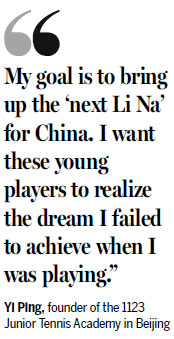
Each player is allowed to compete in the 20-plus International Tennis Federation circuits around the world for a year, which gives them more opportunities to go head-to-head with their generation's top players.
"The concept of 1123 is in line with professional coaching, and the pattern is much closer to the needs of professional tennis," coach Zeng said. "I didn't have such opportunities when I was playing. I believe 1123 is the first academy of its kind in the country."
In honor of Yi's efforts, the Chinese Tennis Association has authorized the academy to set up an "experimental class for excellent reserve players", with the goal of training young players for the national reserve team. Now, the academy runs three teams - under-14, under-18 and the professionals.
"The method used at the academy is an attempt to produce professional tennis players, and through years of development, it's proved to be a successful one," said Chen Yalin, an official from the China Tennis Administrative Center, who oversees the training of the reserve team. "Most of the young players in the academy are at the top level in their age groups, and they are backbone of the Chinese national junior team."
Former champion Li also served up a volley of praise. "The 1123 academy is a new operating model for training junior players, which means a larger number of young tennis talents can enjoy the most-advanced training models, like in Western countries," she said. "Compared with my generation at the same age, they have more promise, and they are the future of Chinese tennis."
Game, set and match?
The girls' achievements have repaid Yi's five years of belief and commitment. Zheng has reached several finals on the ITF Junior Circuit and now sits in the top 20 of the world junior rankings. In July, Cao Siqi, 16, won the 2015 Agile Cup International Tennis Federation Junior Circuit in Beijing, and having just started her professional career, Wang Yafan, 21, has climbed to 126 in the World Tennis Association's rankings.
"Competing overseas has opened my eyes. I can learn a lot from my opponents from other countries, which encourages me to do better and better," said Cao, whose highest ITF ranking last year was 58, before an injury saw her slide in the pecking order.
"My goal is to play the Grand Slam like Li Na, and win it," she said.
Coach Zeng also has high expectations of his young charges. "The players here are high quality and I'm very confident about them," he said. "Although it's difficult to say how long it will take, their performances have already been beyond expectations, and I'm looking forward to bringing up the next Li Na."
For her part, Yi is determined to temper ambition with patience. "My ultimate goal is to see another successful player like Li Na, but I'm not going to rush things. I'll accompany the players to ensure they progress and grow gradually and normally," she said.
"Our original plan was to see the current level of achievement after about eight years, but we got there in just five years. It's kind of like burning money, but I love tennis and I'm confident that all the players have bright futures."
leilei@chinadaily.com.cn
(China Daily 07/20/2015 page5)
Today's Top News
France returns 32 cultural relics to Chinese museum
Warren Buffett, Johnny Depp buy Greek islands
Mayor to turn Zhanjiang into green economic powerhouse
Private firms' access to arms sector widens
China, World Bank pledge $50m for poor
Web companies asked to support 'digital Silk Road': Zhanjiang forum
Risks growing for cybersecurity
China's stock wobbles may deter foreign investors - for now
Hot Topics
Lunar probe , China growth forecasts, Emission rules get tougher, China seen through 'colored lens', International board,
Editor's Picks
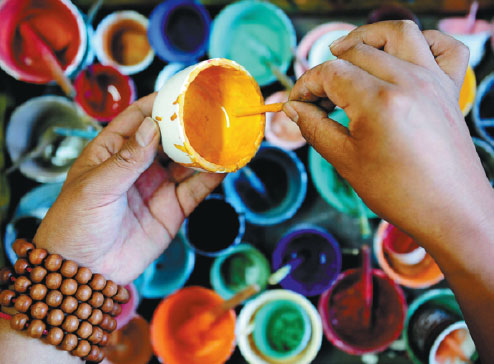
|
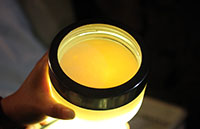
|

|

|

|

|
